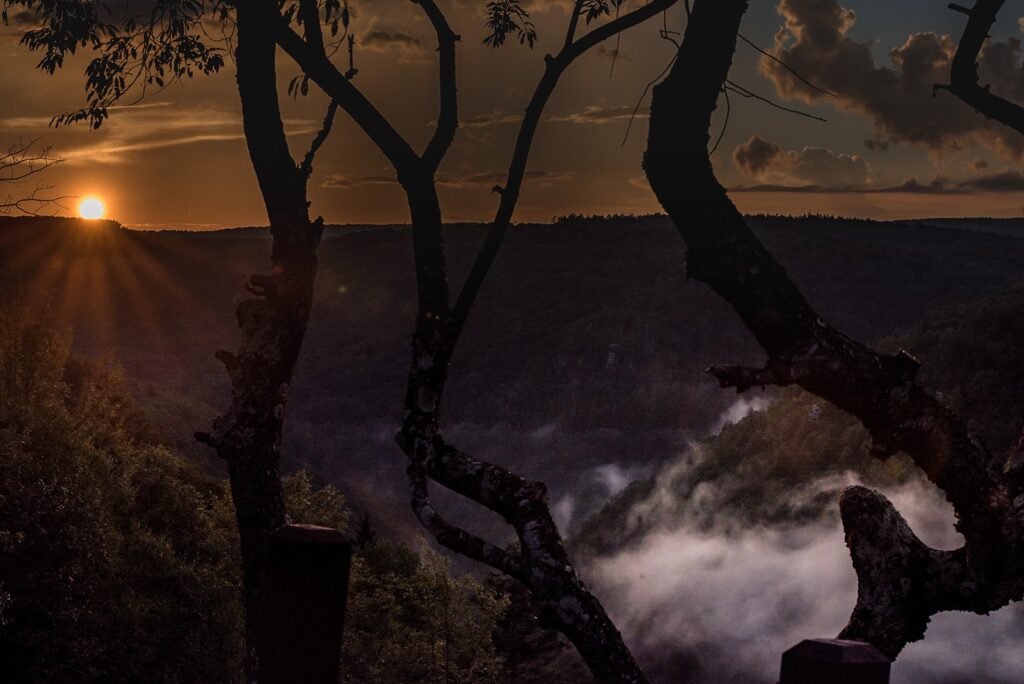Turning on the Lights on Sin
Darkness enveloped the room as tears slid down my cheeks. I was no more than seven, though the decades since have fuzzied the edges of the memory. I do remember the fear that covered my body as I watched the shadows creep across my bedroom wall. The dark shape inched back and forth while my cries remained hidden from the rest of the house.
My exhaustion beat out my fears as I finally succumbed to sleep. When I awoke, the sunshine exposed the source of my terror. What I thought was a monster was merely an open closet door and the shadow of my dresses swaying in the current of my fan.
For years after—even when I was at an age where I probably shouldn’t have been afraid of shadows—I would religiously make sure my closet door was slid shut before I got in bed at night. Now, the funny memory from my childhood reminds me of the relief found when we grasp the reality of that which terrorizes us.
I’m almost thirty-six now, and shadows on my wall don’t exactly stoke the fear they once did. Instead, other terrors grip my heart at night and throughout the day. They whisper at me while I’m getting groceries. What if it happens at this Walmart? What if it’s today? Monsters begin to knock at my brain when I feel the weird lump in my arm or an ache in my neck. It could be something serious. It might not go away.
All around our world, darkness looms. It takes our once-vital bodies, our most precious relationships, or even our loved family members from our arms. We call it a curse of sin and use words like poison, brokenness, or death to describe the sin that covers the world on this side of the fall. While these aren’t bad words to use, their frequent use can provide us with a skewed perspective of sin. We start to see sin as its own entity—a noun in its own right—a creature, force, or shadowy monster that exists and wreaks havoc against the world. We wonder why God let sin into the world and when he will finally banish this force away forever.
Yet we must remember sin itself isn’t a creation. God is the God of all things, and after he made the world, he deemed all of his creation good. Sin came after. It didn’t come as some force that acted upon God’s good world, but in the rebellion of his creation. Adam and Eve turned away from God’s direction, and every piece of his creation from that point on did as well. Animals no longer lived peacefully with man. The cells and organs of our body rebelled against the orderly way they were made to operate. All of mankind, from Cain to you and I, rejected their purpose to love and glorify our Creator. Even Satan himself was a created being who rejected his own nature in order to rebel.
Herman Bavinck summed it up by saying, “sin is not a substance in itself, but that sort of disturbance of all the gifts and energies given to man which makes them work in another direction, not towards God but away from Him.”1 Scripture affirms this by using words like unrighteousness, lawlessness, and transgression to describe sin (1 John. 3:4, Ps. 51:1-2, Rom. 1:18). These words firmly point us to see sin isn’t an original part of nature, but a corruption of the good.
And this more true definition means we have the greatest hope—that he who created all is exactly the one who can set everything right. By turning on the lights and looking at the real source of the shadows in the world, we’ll remember redemption is possible. Not through our own effort, but “by the power of Divine grace which is stronger than every creature.”2 For Christ came to “reconcile to himself all things, whether on earth or in heaven, making peace by the blood of his cross” (Col. 1:20).
Imagine for a minute what it means to have every piece of this world reconciled to Christ—for every cell in this world to move towards God. The dangerous storms that stir up within the oceans will quiet their swells from destruction. The teeth-baring lions and poisonous rattlesnakes will stop their hunts and come under the submission of their Creator. The bodies you and I have right now will halt their aches, pains, and dysfunction and finally order themselves as they were intended to. Everything will be redeemed.
The stretch of sin in this world is vast. The glimpses of it hurt. But we need to have a right understanding of the problem. God’s good creation isn’t lost, destroyed, or threatened by some outside force. It’s here, yet pushing against the purposes for which it was made in a million different ways. One day, judgment will come for sin, but because of Christ’s perfect life, sacrificial death, and resurrection every stray organism, weather pattern, cell, organ, and every trusting saint will find their redemption. And everything corrupted will be made new.

